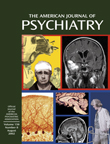A Lack of Self-Consciousness in Autism
Abstract
OBJECTIVE: This study investigated self-consciousness in autism. METHOD: An incidental memory task was conducted on 18 adults with high-functioning autism and 18 normal comparison subjects. Three kinds of orienting questions (phonological, semantic, and self-referent, i.e., “Does the word describe you?”) were asked about target words (adjectives for personality traits) in order to induce different types of processing. This was followed by an unexpected recognition test. RESULTS: While semantic processing resulted in better memory than phonological processing in both groups, self-referent processing yielded better memory performance than semantic processing in the comparison group but not in the autistic group. CONCLUSIONS: The results suggest deficits in self-consciousness in individuals with autism.



